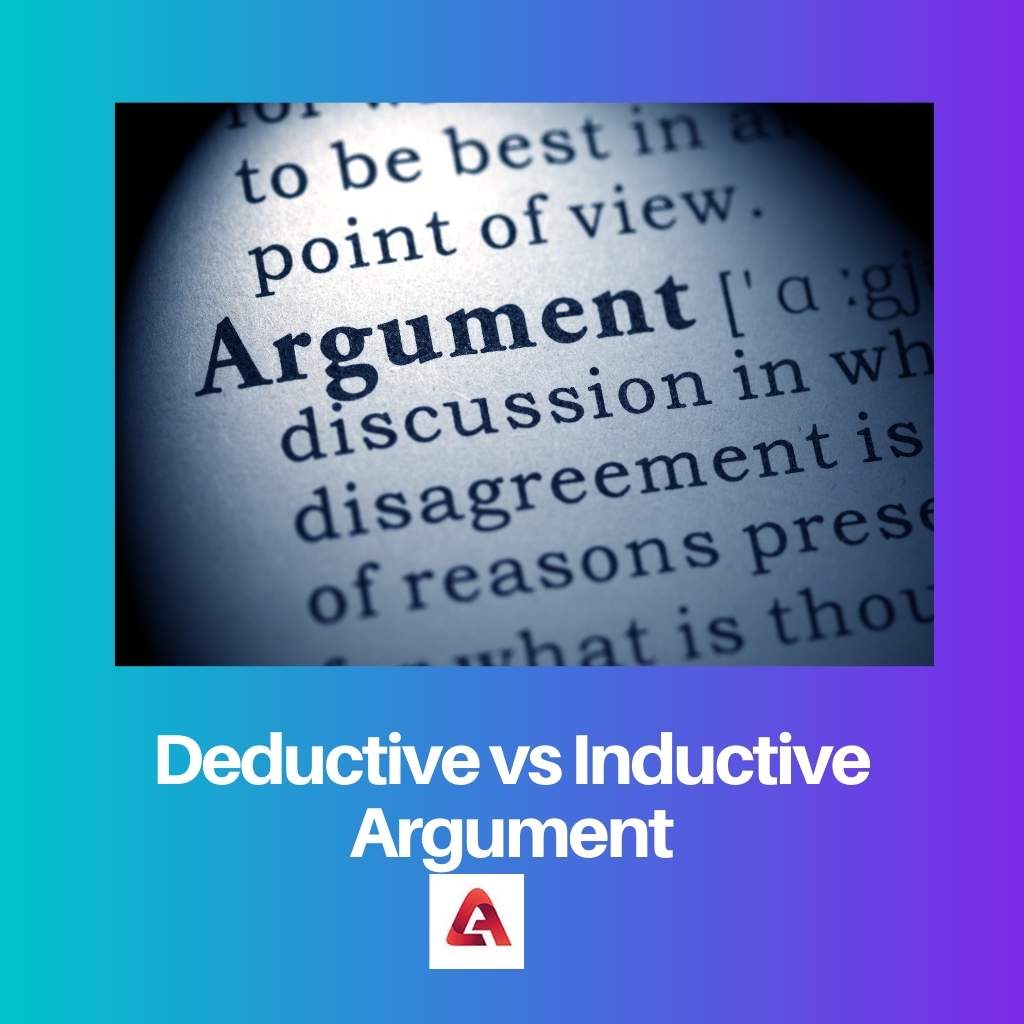The process of argument and reasoning in artificial intelligence is of basically two types. One is a deductive argument, whereas another one is an inductive argument.
Many people are confused regarding how they must differentiate between deductive and inductive arguments or reasoning. Both methods are unique and distinct from each other.
Key Takeaways
- Deductive arguments draw specific conclusions from general premises, ensuring logically certain conclusions when premises are true.
- Inductive arguments infer general conclusions from specific observations, resulting in probable but not certain conclusions.
- Both argument types serve different purposes, with deductive arguments offering certainty and inductive arguments enabling generalization from specific cases.
Deductive vs Inductive Argument
The difference between deductive and inductive arguments is that deductive arguments make use of all the possible facts, data, and case studies to arrive at a reasonable result and conclusion, whereas inductive arguments present a generalized conclusion with the help of certain observations and facts.

Deductive arguments refer to the conclusions or arguments drawn by an individual with the help of generalized principles and statements. In this form of argument, conclusions are drawn from multiple statements and inferences. Deductive arguments or reasoning are entirely based on the basic rule of argumentation.
Inductive arguments refer to the general policies and statements that are concluded from real-life events and instances.
One of the major drawbacks of inductive reasoning is that there is a high chance that the conclusions drawn from various statements may be false even if all the facts supporting them may be correct.
It is a procedure in which multiple observations are made at the same time.
Comparison Table
| Parameters of Comparison | Deductive Argument | Inductive Argument |
|---|---|---|
| Definition | Deductive argument refers to the basic form of reasoning and argument with the help of proven facts and generalized statements and inferences. | Inductive argument refers to the conclusions that are drawn from real-life events and human practices and actions. |
| Approach | Deductive arguments follow a top-down approach to solving any sort of logical problem. | Inductive arguments follow a bottom-up procedure to conclude a particular problem. |
| Factors | Deductive arguments are based on various types of practices, facts, and universal truths. | Inductive arguments are based on events and their nature of the occurrence. |
| Initial point | The starting point or beginning point of deductive reasoning is the premise of a particular statement. | The starting point or beginning point of inductive reasoning is a conclusion drawn from a particular statement. |
| Strength of argument | The argument put forward by the deductive argument may or may not be valid. | The argument or conclusion put forward by inductive arguments may or may not be strong and true. |
| Structure | Deductive arguments draw specific conclusions from general statements. | Inductive arguments draw general conclusions from specific statements. |
What is a Deductive Argument?
A deductive argument refers to the exhibition of multiple statements for drawing inferences and conclusions from them. The probability and extent of the truthness of the conclusion depend on the degree of truth that the statements or sources possess.
In the process of deductive argument, if all the facts and figures supporting the statement is true, and the entire specialized process of a deductive argument is attended, then the conclusion and result tend to be true indeed.
Some examples of deductive arguments are as follows:-
We have to classify two statements as premise one and premise two. For example, “All human beings are selfish in nature.” Let this be the first premise. “Every woman falls under the category of human beings.” Let this statement be the second premise.
So the conclusion, as per deductive argument, tends to be, “Every woman is selfish.”
Another example of a deductive statement that tends to be valid but is not sound is:-
First premise- An organism that eats a lot of chillies is a parrot.
Second premise- Harsha eats a large number of chillies every day.
Conclusion- Harsha is a parrot.
This statement may seem to be valid but is not sound as Hasha is human and cannot be termed as a parrot just because he is fond of eating chillies.

What is an Inductive Argument?
Inductive argument refers to the process of formulating general principles and statements after careful analysis and study of certain events and real-life situations.
One of the major drawbacks of inductive reasoning is that even after all the premises and situations are valid, the conclusion may eventually tend to be false. Some of the major examples of inductive arguments are:-
The first premise- Rahul always leaves home for the office at 7:00 a.m.
The second premise- Rahul always leaves his house on time and reaches the office on time.
Conclusion- If Rahul leaves his house at 7:00 a.m., he will always reach the office on time.
Another example of an inductive argument is:-
First premise- The A.C. in the hall of Voltas.
Second premise- The A.C. in the upper hall is of Voltas.
Third premise- There are only two halls in the banquet.
Conclusion- The banquet has two A.C.s that are of Voltas company.

Main Differences Between Deductive and Inductive Arguments
- Deductive argument refers to the process of formulating conclusions with the help of facts and statements, whereas inductive argument refers to the process of formulating generalized statements with the help of real-life events.
- A deductive argument follows the top-down perspective. On the other hand, the inductive argument follows the bottom-up perspective.
- The initial point of a deductive argument is a premise, whereas the initial point of an inductive argument is the conclusion itself.
- The major drawback of a deductive argument is that the conclusion may be not valid, whereas the major drawback of an inductive argument is that the conclusion may not be true.
- The deductive statement draws specific results from generalized statements, whereas inductive statements draw general conclusions from specific statements.


This article does a great job explaining the key differences between deductive and inductive arguments, making it easy to understand the concepts.
This article’s detailed comparison table is very helpful in understanding the key differences between deductive and inductive arguments. Well done!
I appreciate the way this article breaks down the main differences between deductive and inductive arguments, making it accessible to readers at all levels of familiarity with the subject.
The examples of deductive and inductive arguments provided in this article are thought-provoking and shed light on the complexities of reasoning.
It’s evident that this article was thoroughly researched and well-written. The information about deductive and inductive arguments is presented in a clear and concise manner.
It’s interesting to learn about the strengths and weaknesses of both deductive and inductive arguments. This article provides a thorough analysis.
I appreciate the clear examples provided in this article to illustrate the concepts of deductive and inductive arguments. Very informative!
I find it fascinating how deductive arguments are based on universal truths while inductive arguments are more focused on real-life observations. Great comparison!